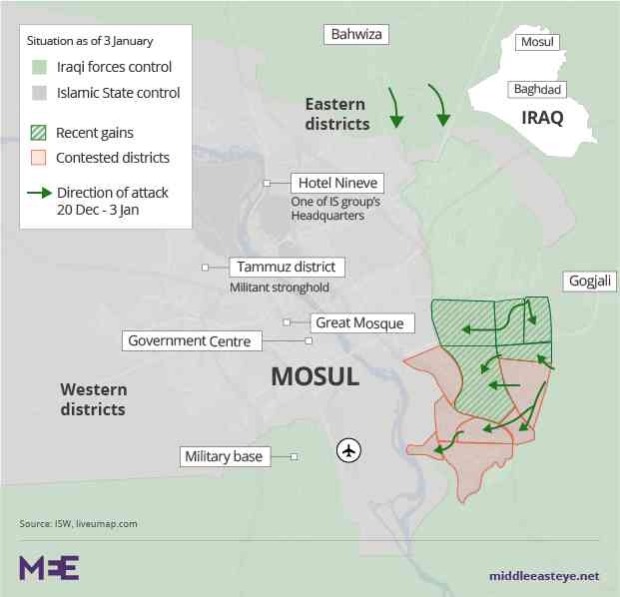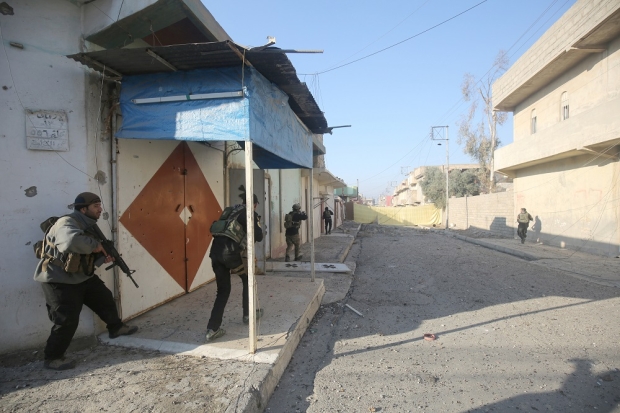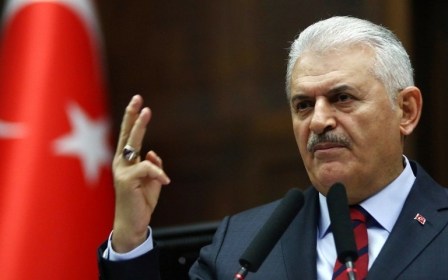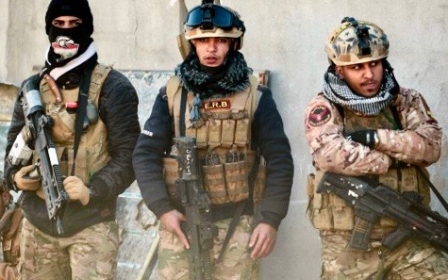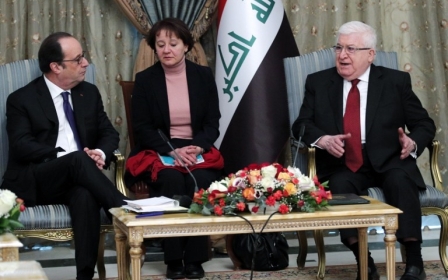Attack on Mosul: World’s biggest military operation runs into trouble
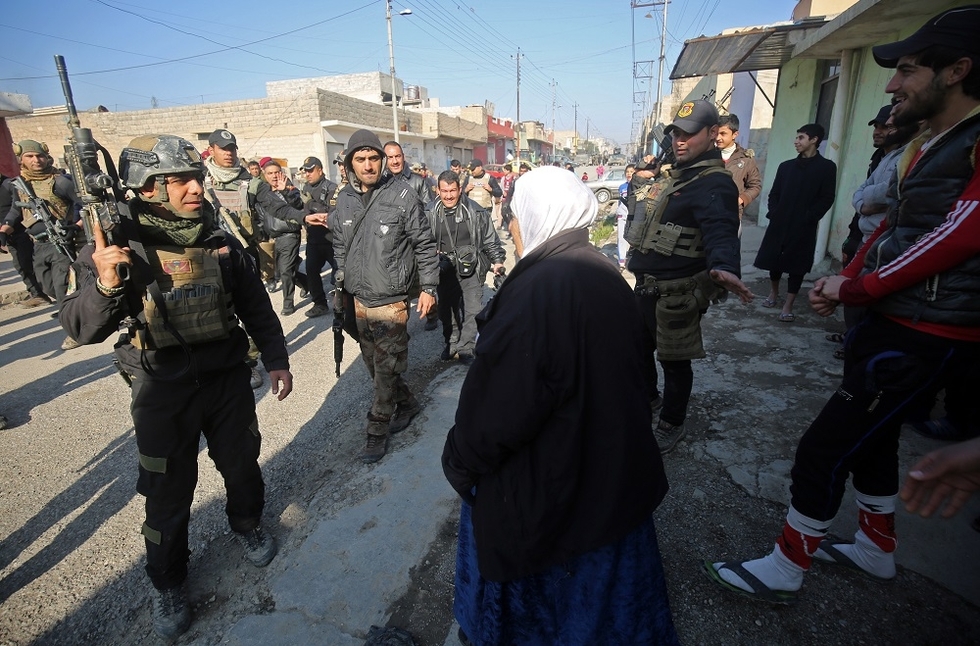
October 17th saw the start of the world’s biggest military operation since the invasion of Iraq in 2003. The Iraqi government, supported by a coalition of more than 60 partner nations, including the United States and the United Kingdom, began the much-anticipated effort to retake Mosul, the largest city under control of the Islamic State group.
A mass of soldiers surrounded the city Mosul, the beating heart of the Islamic State’s “caliphate”, and at first light, with the world’s media embedded, the attack was launched. But now, barely two and a half months in, with a third of the city recaptured, the operation is facing a chronic manpower crisis.
READ: Battle for Mosul: US troops fighting near front lines
Following their capture of Bashiqa, Kurdish forces ceased advancing. Instead, they started fortifying the new western frontier of Iraqi Kurdistan.
This was to be expected. The potential for an ethnic or sectarian backlash in a largely Sunni city such as Mosul was great. Kurdish or Shia soldiers carried with them a serious possibility of igniting the city’s sectarian tinderbox.
The US-led coalition has also been understandably reluctant to commit ground troops in a combat role, at least officially. However, there is evidence that this policy is changing. On Christmas Eve the US announced it was “deepening integration” of US forces with the Iraqi army.
Over-reliance on ICTS
Fears of rampant sectarianism within Iran-backed Shia paramilitaries forced Prime Minister Haider Al-Abadi to publicly promise that the militias would not enter the city.
Thus, it was left to Iraqi Counter Terrorism Service (ICTS), battle hardened from the clearing of jihadist hotspots such as Ramadi and Fallujah and supported by regular Iraqi army units and the Federal Police, to lead the urban charge.
Numbering around 8000, including support staff, the ICTS are a “quasi-ministerial” organisation. Parallel to, but outside of the army, they take orders directly from the prime minister’s office. Initially trained to US Special Forces standards by US operatives, they fast gained a reputation as “the best Arab Special Operations Forces (SOF) in the region”.
But Mosul is not the empty shell of a city that Ramadi and Fallujah were. It remains densely populated, with a population of as many as 1.5 million people. A factor that has severely limited the ability of the same airpower which proved critical in pushing IS out of strongholds such as Fallujah.
In order to avoid civilian casualties, the Mosul operation has had instead to rely on ground forces clearing neighbourhoods on vehicle and by foot – something which has played into the hands of the Islamic State.
READ: How IS has made life tough for Iraq's elite forces in Mosul
In December, one senior Pentagon official told Politico that some ICTS battalions were suffering up to 50 percent casualty rates whilst other analysts estimate ICTS casualties at 35 percent.
Iraqi government officials are fiercely defensive when it comes to these numbers, often threatening those photographers who take pictures of wounded soldiers, and flat out refusing to answer questions regarding casualty figures. Hence, it is impossible to know the true extent of these casualties.
That being said, one senior ICTS Golden Division officer did concede to Middle East Eye in early December that the current rate of casualties was “completely unsustainable”.
Acknowledging the looming manpower crisis, efforts were made at the start of last month to reduce reliance on the ICTS. On 6 December, the Iraqi army’s 9th division – the only armored division in the army - attempted to open a new front in the south east of the city, independent of the ICTS.
Iraqi troops advanced towards the Al-Salam hospital to bring them within striking distance of the Tigris River that cuts through the heart of the city. But instead of searching and clearing properties along the way, the division’s commanders elected to push forward and capture the hospital.
This disaster was as much an issue of poor leadership at the battalion level, something that has plagued the Iraqi army since US withdrawal, as it was an organised opposition.
Premature battle
Many of these shortcomings, particularly the high casualty rates, can be attributed to operations to recapture Mosul being commenced prematurely.
David M Witty, an Iraqi military analyst, retired US Army special forces colonel and former advisor to the ICTS, suggests that Iraqi counterterrorism forces began the assault against Mosul before isolating it.
“ISIS was able to dictate the terms of the battle and throw all its best forces against CTS whilst the Iraqi army and [Federal] Police re-gathered outside the city limits,” he said.
A variety of political pressures had also dragged the date of the operation forwards. Witty suggests that the battle started before “the Iraqi army and police forces had been properly rebuilt from the debacle of 2014” when whole battalions stripped off their uniforms and deserted Mosul in the face of just a few thousands IS fighters.
'ISIS was able to dictate the terms of the battle and throw all its best forces against CTS whilst the Iraqi army and [Federal] Police re-gathered outside the city limits'
- David M Witty, Iraqi military analyst
The highly-specialised nature of the ICTS is evident in its name.
“It was never envisioned to be used as a main battle force clearing a city, and so it did not have that type of training or equipment,” Witty says of the ICTS.
Counterterrorism units have notably lost hundreds of US-made Humvees whilst fighting in Mosul, a vehicle hugely inappropriate for waging urban warfare. One could go as far saying that the streets of eastern Mosul are littered with these festering mechanical carcasses.
Now the pride and joy of Iraq’s security apparatus is down, but not necessarily out. With more than half of the city left to be recaptured, tough battles certainly remain ahead.
The question now is: are the rest of Iraq’s security forces capable enough, and willing to pull their weight in the battle for Mosul, or are they going to continue to lean on the ICTS until they are rendered combat ineffective?
- Gareth Browne is a freelance journalist covering the Middle East. A graduate of the University of Exeter and an Arabic speaker, he tweets at @brownegareth
The views expressed in this article belong to the author and do not necessarily reflect the editorial policy of Middle East Eye.
Photo: Members of the Iraqi Counter Terrorism Service talk with civilians as they advance in Mosul's eastern al-Karamah neighbourhood on 2 January (AFP)
New MEE newsletter: Jerusalem Dispatch
Sign up to get the latest insights and analysis on Israel-Palestine, alongside Turkey Unpacked and other MEE newsletters
Middle East Eye delivers independent and unrivalled coverage and analysis of the Middle East, North Africa and beyond. To learn more about republishing this content and the associated fees, please fill out this form. More about MEE can be found here.



